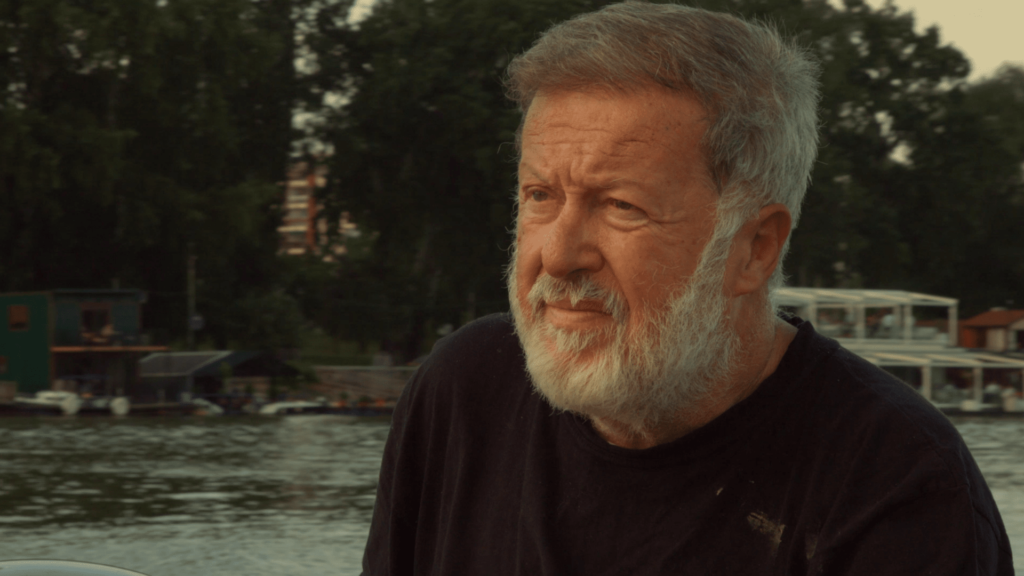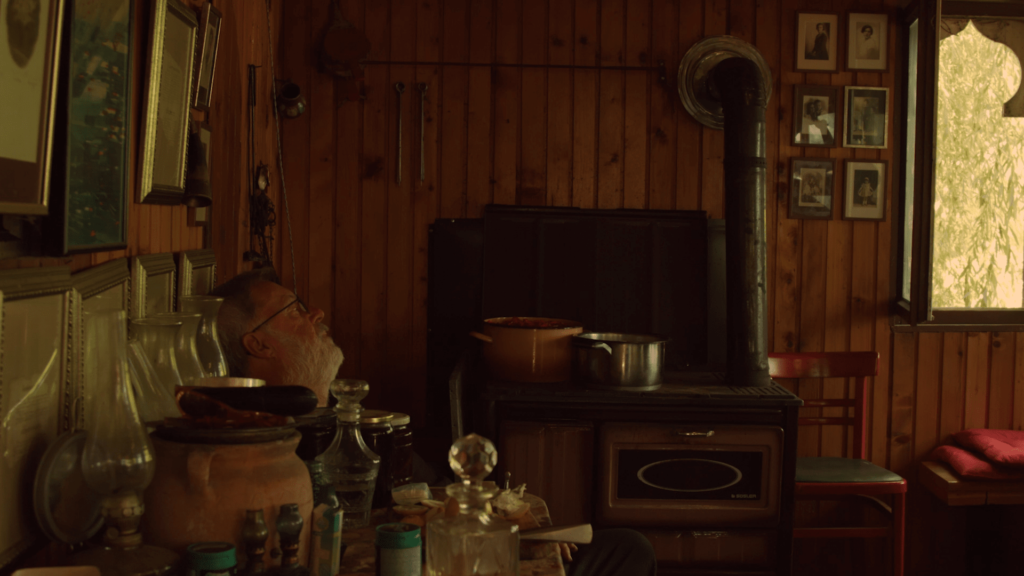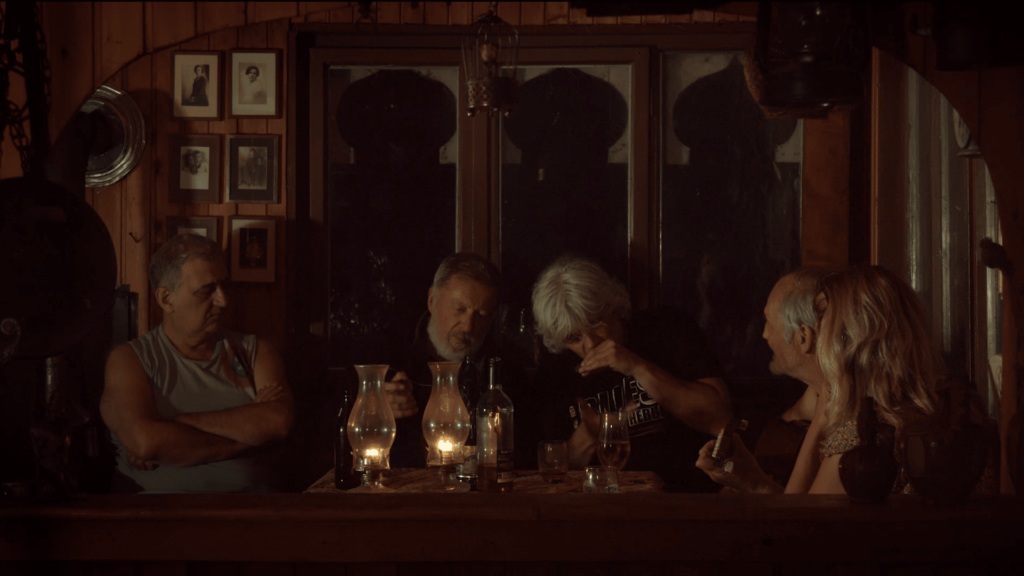Directed and Produced by Ivana Todorović
Cinematography: Maša Drndić
Editor: Marija Kovačina
Sound: Radiša Cvetković, Ivan Antić
Colourist: Milica Drakulić
Music: “Oj Moravo”, Pera Joe
Editing Advisor: Jelena Maksimović
Title Design: Isidora Nikolić, Milos Ćosović Desko
Special Thanks: Adem, Srdan Keča, Ružica Todorović, Vera Gojković, Iva Radivojević, Marela Kovačina, Milina Trišić, Tika Taka Vege, Dragan Von Petrović
Translation: Abdelraheem Kheiravi, Jodie Clifford
Interview

Ivana Todorović
Filmmaker
“Short-form filmmaking
is very challenging to me.
How to make a strong emotional film
in less than 20 minutes?”
- Could you introduce yourself?
I’m from Belgrade, Yugoslavia, today Serbia. I make short, socially engaging films. I’m in love with film, interested in people, and like to find ways to open the dialog in society.
I started making my films in my neighborhood in Belgrade, and since then, I feel like I’m making films about my neighbors. I felt the same when I lived two years in New York City and made a film there.
Short-form filmmaking is very challenging to me; how to make a strong emotional film in less than 20 minutes? I have made 8 short films so far and I’m preparing two new ones. Short-form still keeps me excited! My last film was my first short fiction film and I enjoyed working in fiction too.

- How did this project start? How did you meet Adem?
I met Adem ten years ago on the island Ada Međica. This island is in my neighborhood and I love spending time there. I met him for the first time when I found him on the island and decided to focus on him in a student documentary for the Ateliers Varan Belgrade summer workshop (part of the Jean Rouch documentary school based in Paris).
We were practicing telling a story in short documentary format and I told the story of Adem’s life as a Muslim from Bosnia on the island. I was not very happy about the resulting film so I never released it. In the following years, I visited Adem on the island and I became good friends with his daughter Ivana too.
I knew she had problems with depression. A few months after Ivana’s suicide my father died of brain cancer. There was so much sadness in me. One day, I went to the island to see Adem. I was talking with him about grief and how to live with it in everyday life. In the way he talked about it while we were sitting in his house on the island, I realized this is a story I must tell. How one father deals with grief in everyday life. It was my emotion too, grief for my friend and for my father, so making this film was an emotional experience for both of us.
- What can you tell us about Adem?
Adem was born and grew up in Banja Luka, in Bosnia. After getting married, the couple moved to Belgrade. As he lived near the River Drina in Banja Luka, he immediately found his place on the island Ada Međica on the River Sava.
When the war started in Bosnia, lots of Adem’s family moved to Sweden. He and his daughter Ivana were devastated by the war, and they had some problems being Muslims in Belgrade. Adem also hosted refugee friends from Bosnia on the island. He also had lots of good friends in Belgrade, Serbs who helped him too, and that’s why he stayed to live in Belgrade.
He is the only person living on the island, other people come there to their vikend houses. He has his house on the island, a yard and a boat house. He also held a mini little tavern in his house, and his friends gathered, and occasional guests on the island. He cooks food for them and they hang out and sing together. It’s often a gathering of people from all over ex-Yugoslavia.
He has a wonderful personality, smiling, making jokes, and loving people so there is always some guest at his house! He loves telling stories too and is a big talker. He loves his solitude also; when he gets to read books and listen to music, mostly in the winter.

“I wanted the audience
to have space to wander
with their feelings of sadness.”
- At the end of the film, Adem hugs a tree. Belgrade is a big city, yet Adem seems to live surrounded by greenery. What place does nature take in Adem’s life?
Nature is most important in Adem’s life. He said that’s why he is still alive. His trees, his roses, his river… He breathes nature. Each morning he takes his dog to walk and hugs the trees. He is on his boat on the river, driving at least two times a day to finish obligations, do shopping, drive friends…
- Your film is slow-paced, composed of long, wide, still shots. The sound plays an important part. We can listen to the wind, the birds, the crickets, the lapping of the river, the log creaking in the fire… What was your intention, from a narrative and stylistic point of view?
We spent a lot of time finding the style for this film. I knew that it must be a slow film as sadness is a slow process and we get lost in memories in everyday activities. That’s why Adem’s mind wanders in memories, in voice-over, when he is doing his work.
I wanted the audience to have space to wander with their feelings of sadness. Grief is a sad emotion. Yet life still has lots of beautiful moments. That’s why the framing in the film was very important. We were looking for beauty.
I was happy to work with Maša Drndić from Rijeka, Croatia, as director of photography. The narrative of the film follows one day in the life of a man. We wanted a very simple form of the film as we planned on having long steady shots.
The sound of the film was treated as an equal part to the image. The audience must feel the island completely. I was fortunate to work with Radiša Cvetković who did the sound for the film, and Ivan Antić who did postproduction of the sound.

- Adem seems to be very alone, isolated. Then we suddenly see him surrounded by friends, playing music, drinking… This musical parenthesis is beautiful, emotional, and contrasts with the silence in which Adem seems to live. Can you tell us more about this particular scene?
Grief is a feeling we carry in our everyday life, but there are wonderful moments which take us away from the feeling of grief; we forget a little bit how we feel. In Adem’s life, his friends make music for him very often. These moments are happening in the night… Adem enjoys the moment; after which he is again alone with his thoughts and feelings… Like all of us at the end of the day.
To shoot this scene, we needed to prepare good lighting so we made an agreement with Adem to schedule his friends to make music for him. They were playing for him all night and we had hours of footage. We chose the most emotional moments.
This scene is a climax in the film, so it was very important for it to look good.
- What are you working on now?
We are finishing a short observational documentary film about the last days of horses’ lives. It is set in the only horse asylum in the Balkans. We are also editing a short essay documentary film about the fragility of a woman’s body in a gynaecology hospital. In addition, I’m writing a story for a short fiction film.
- A word about 99 and the multilingual subtitling of your film?
I’m honored, and my team is as well. The film will be seen by a new audience in their native language! I hope they will enjoy the film. Thank you for this opportunity.
And also, if any one of the people who see the film ever comes to Belgrade, they should visit Ada Međica and Adem. He is a great host!
